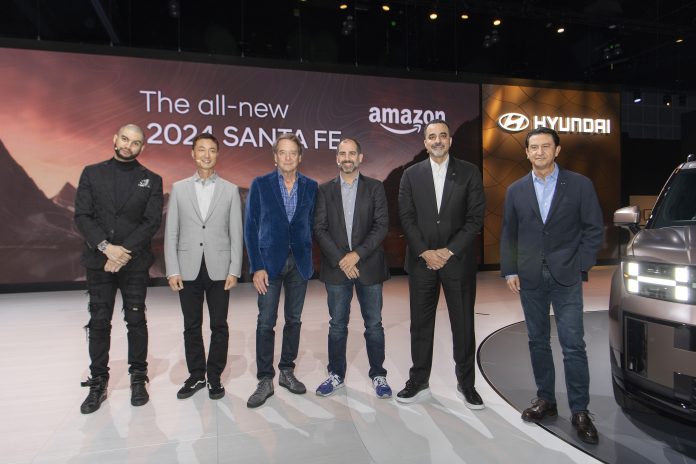Well, we’ve expected this for some time: Hyundai and Amazon are doing a collab in 2024, and everyone from industry insiders to the average Amazon Prime member is talking. At first glance, this partnership looks like the future knocking on our door, complete with a digital bow. But, in Amazon’s holiday style, let’s delay the shipment and take a closer look.
The Hyundai, Amazon Spectacle: More Sizzle Than Steak?
The Hyundai-Amazon collaboration is being heralded as a revolutionary step, bringing the car-buying experience into the digital age. But currently, “the future of shopping” looks like just another online showroom, albeit a much better and simplified effort than Hyundai’s webpage. You can build and then go to a local dealer to search inventory. Hmmm, okay, “the future” kinda looks like the present. So, it’s not entirely fleshed out yet, I guess.
But let’s be honest. Even if it eventually becomes what Hyundai and Amazon say—meaning you can build, price, and buy online and then pick it up in-store—isn’t this just a glorified version of 2007 Walmart Site-to-Store service with a shiny automotive veneer? Nothing’s original of course, but still. Sure, you can peruse Hyundai models on Amazon, the modern-day marketplace giant, but consumers aren’t buying directly from the factory or even getting access to every vehicle.
As reported in Car and Driver, Amazon says, “Customers will have the option to narrow their search by available vehicles in their area by looking for specific preferences, including model, trim, color, and features. They can then choose their preferred car and check out online with their chosen payment and financing options, all done directly in Amazon’s system. Once the sale has been completed, pickup and delivery will be handled through each customer’s local Hyundai dealership.” Let’s review that last part—‘pickup and delivery will be handled through each customer’s local Hyundai dealership” is “the future of shopping.” I would put a roll-eyes GIF here if I could.
Impact on The Dealership Model
Let’s face it: for many consumers, the traditional dealership model is like that relative everyone tolerates at family gatherings. Necessary, but not always pleasant. This partnership, while dressed up as groundbreaking, doesn’t eliminate the dealership from the equation.
Customers will still wade through the tightly parked sea of cars at a local Hyundai/Genesis showroom for that test drive. And I can’t imagine how there will be an alternative for those final hours or more of financial paperwork, but maybe Amazon has a plan. But I’ll bet it’s not the dealership-free utopia consumers might be dreaming of and maybe it shouldn’t be.
After all, there’s an emotional part of purchasing vehicles that can’t be replicated in the dopamine-producing Amazon purchase. Dealerships serve to understand, in a face-to-face relationship, what the buyer is looking for and discern what would fit their needs. Amazon AI, yet, can’t do that. And if a person buys a car that isn’t right for them as in doesn’t fit, bought by mistake, or isn’t the right color, how’s that 30-day return work?
Now, speaking of progress, a 30-day return window is a thought to ponder. Prime members might get a chuckle imagining “returning” a car with the ease of a misplaced Amazon order.
This press release doesn’t address any of that, and I have yet to see any press ask the questions. Most of us have taken the bait and heralded this as the next new thing. Amazon is amazing at so many things and is also great at press releases.
While all that’s a stretch and said in jest, it highlights consumers’ growing expectations in an Amazon-dominated retail landscape.
However, as the English proverb says, “Great oaks from little acorns grow.” So, progress has to start somewhere, and this move by Hyundai and Amazon is more than just a flashy headline. It’s a signpost pointing towards a future that many in the industry have yet to acknowledge.
Imagine a world where regional or county Tesla-style dealer boutiques and hand-delivered test drives become the norm, with Amazon-style mega-service warehouses. As scary as that might be to dealers, the traditional dealership model is evolving, like it or not.
Convenience vs. Tradition: A Balancing Act
President and CEO of Hyundai Motor Company Jaehoon (Jay) Chang said, “Amazon is the ideal partner to help realize our vision of progress for humanity.” Think about that statement. Have we come to the point where selling on Amazon is progress for humanity? Oh my, I guess the “progress for humanity” bar’s set pretty low these days.
Well, all the far-reaching language notwithstanding, we must admit that shifting towards a more digital, customer-centric approach is inevitable. The automotive industry must adapt to the changing tides of consumer preferences. Convenience is king in today’s fast-paced world, and if a partnership like Hyundai-Amazon can magically streamline the car-buying process, consumers will think it’s a step in the right direction.
The Bottom Line: Change is Inevitable
After the COVID fear campaign, there was a 66% rise in online ordering and curbside pickup. So, given how life changed during and after lockdowns, the Hyundai and Amazon partnership, while not a complete overhaul of the car buying process, is a significant indicator of where the industry is headed.
Dealerships and automakers alike need to brace themselves for the shift towards digitalization. It’s not just about selling cars anymore; it’s about providing an experience that resonates with the modern consumer.
The sooner we embrace these changes and adapt, the better positioned we’ll be to ride the wave of the future. After all, in an era where convenience and efficiency reign supreme, the automotive industry cannot afford to be left in the rearview mirror or, as it were, at the Amazon Locker return.




